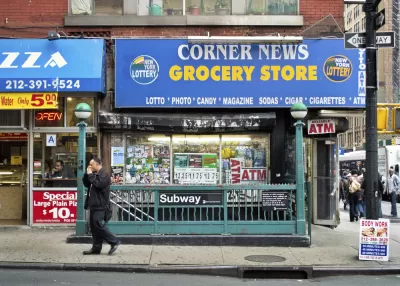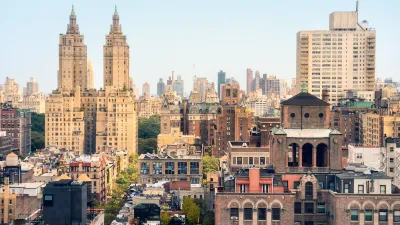Bodegas play an essential role in the communities they serve. Under threat by online retail and encroaching chain stores, they face a new danger from technology. New York YIMBY gives them a well-deserved shout-out.

Urbanist Jane Jacobs is credited with developing the concept, “eyes on the street," to describe how vibrant urban neighborhoods, complete with "a healthy neighborhood retail scene," make for safer places to live, writes Nikolai Fedak for New York YIMBY.
With storefronts and their occupants keeping vigilant over an area, criminal activity is deterred, while the pedestrian experience is substantially improved. The concept is not difficult to understand.
In this regard, the local bodega is perhaps one of the most valuable assets New York City real estate has to offer. Besides the aspect of convenience that the neighborhood stores provide, many are also open 24 hours a day (or close to it), providing a spot for local characters to congregate alongside store owners and shop workers.
The sum of this activity plays an immeasurable role in ensuring that peripheral neighborhoods generally lacking in retail still have spots that light up the nighttime streets, and eyes to watch them.
With that introduction, Fedak points to the latest threat from Silicon Valley, the automated bodega. Two years ago it was expanding chain stores, and now these independent mom and pop stores are threatened by even smaller retail outlets.
A campaign against the new startup has been launched by the Association for Neighborhood and Housing Development, "the umbrella organization of 100 non-profit affordable housing and economic development groups, serving low- and moderate income residents in all five boroughs of New York City." The association calls the vending machine outlets "brodegas".
As New York State Coalition of Hispanic Chamber of Commerce Chairman Frank Garcia said, “Real bodegas are all about human relationships within a community.”
Considering the public safety element of bodegas and the importance to neighborhoods not served by larger retail establishments, Fedak recognizes "the unquantifiable gap in quality of living that is likely to result if bodegas do begin to close en-masse."
Though exact numbers are impossible to quantify, the social value of these specific mom & pop retail stores is vastly greater than the material goods within.
Zoning woes
However, as with so many things urban, the problem posed by the new startup can be connected to zoning, which is why brodegas may literally be replacing bodegas rather than occupying new retail space, which Fedak explains is "actually impossible" in many neighborhoods.
Instead of focusing on why “Brodega” is a terrible idea, there needs to be comprehensive reform of where retail can and cannot be built, or the likelihood that bodegas and the rest of the five boroughs’ mom & pop retail scene go the way of the dinosaurs is going to increase substantially.
FULL STORY: Why Bodegas Are Crucial To The Continued Success Of New York City Real Estate

Maui's Vacation Rental Debate Turns Ugly
Verbal attacks, misinformation campaigns and fistfights plague a high-stakes debate to convert thousands of vacation rentals into long-term housing.

Planetizen Federal Action Tracker
A weekly monitor of how Trump’s orders and actions are impacting planners and planning in America.

Chicago’s Ghost Rails
Just beneath the surface of the modern city lie the remnants of its expansive early 20th-century streetcar system.

Bend, Oregon Zoning Reforms Prioritize Small-Scale Housing
The city altered its zoning code to allow multi-family housing and eliminated parking mandates citywide.

Amtrak Cutting Jobs, Funding to High-Speed Rail
The agency plans to cut 10 percent of its workforce and has confirmed it will not fund new high-speed rail projects.

LA Denies Basic Services to Unhoused Residents
The city has repeatedly failed to respond to requests for trash pickup at encampment sites, and eliminated a program that provided mobile showers and toilets.
Urban Design for Planners 1: Software Tools
This six-course series explores essential urban design concepts using open source software and equips planners with the tools they need to participate fully in the urban design process.
Planning for Universal Design
Learn the tools for implementing Universal Design in planning regulations.
planning NEXT
Appalachian Highlands Housing Partners
Mpact (founded as Rail~Volution)
City of Camden Redevelopment Agency
City of Astoria
City of Portland
City of Laramie





























